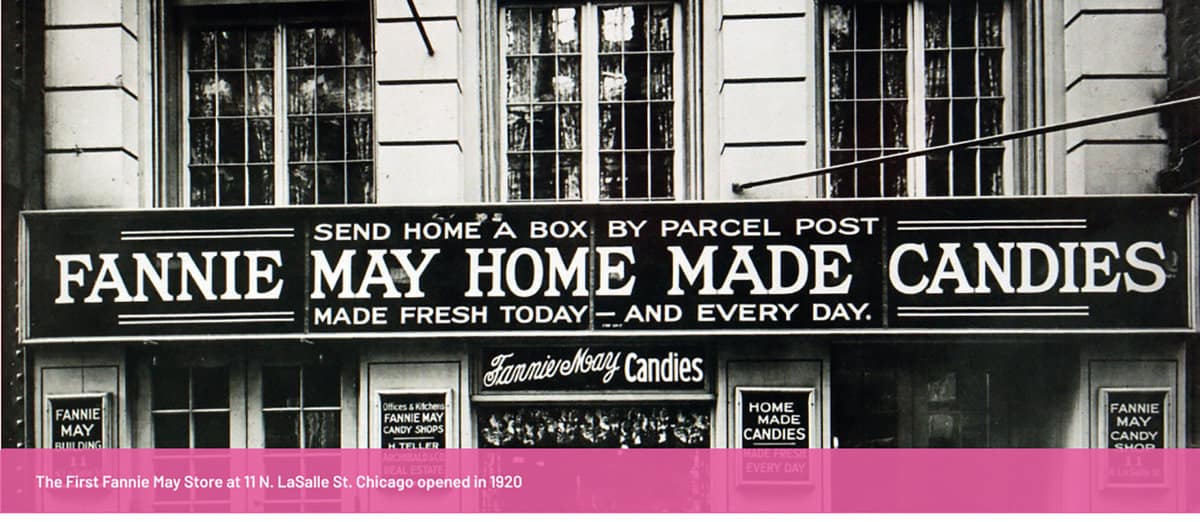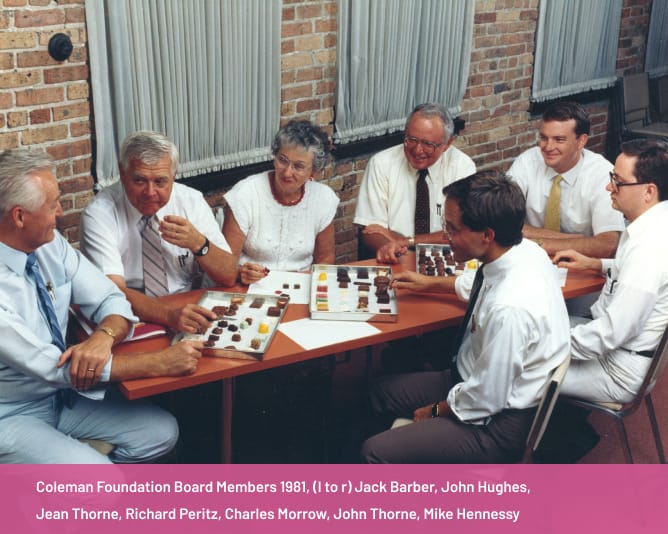
Shelly Davis, Coleman Foundation President & CEO and Mike Hennessy discuss leadership transition in front of portraits of J.D. Stetson Coleman and Dorothy Coleman at the Coleman Foundation offices. January, 2021
Legacy Of Impact
By: Michael Hennessy
Dorothy and J.D. Coleman were owners of Fannie May Candies. They established The Coleman Foundation as a means to give back to the community. The company and the foundation were always separate entities. When I joined Fannie May in 1985, the directors of the Foundation were also long time Fannie May leaders. Fannie May was like a close-knit family of employees. On Monday we made Pixies, on Tuesday we went to Rush to support cancer care.
Share On:
History

At Fannie May Candies the organizational structure was very flat – everyone helped out wherever it was needed. That culture came right from the co-founder Dorothy Archibald. Following the death of her first husband in 1936, Dorothy took over and with the help from experienced candy makers and dedicated staff, she steadily grew the company through the Depression, through WWII, and into the 1940s. When Dorothy married J.D. Stetson Coleman, in 1944, he became chairman, but Dorothy continued as President and had the final say. I never met Dorothy, or J.D., but over time I had numerous conversations with long-time staff, kitchen personnel, and associates. They relayed personal, emotional stories about Dorothy as if she had just walked through the room and they appreciated J.D.’s no-nonsense business approach. Employees at all levels cared for the Company as if it was their own.

After the Colemans passed and their estates were settled, it was 1981 and The Coleman Foundation began its work in earnest. During this time, the Foundation was guided by its first Directors who were long time Fannie May employees and associates, and Michael Furlong, Dorothy’s nephew, who continues to serve as board chair today. In 1992 I left my position as COO of Fannie May to open the first full-time office for the Foundation. While Dorothy and J.D. Coleman did not lay out a specific programmatic vision for the Foundation’s giving, their actions, leadership, values, and the individuals they trusted have guided us. During this time, the Board developed the inaugural program array.
Value in Peer Learning
Running Fannie May stores in hundreds of communities taught us the value of investing in the people and places where we live and work, and of empowering staff to problem solve and share solutions. We brought these lessons to our philanthropic programs. Most of our grantees work in isolation, so we always try to include peer learning and relationship building as part of our program initiatives. We bring grantees together and ask: what they can accomplish jointly, for the common good, that they cannot do alone. “It is in leveraging up collective wisdom and providing resources to address common needs, that I believe The Coleman Foundation has achieved some of our most profound impacts.”
Entrepreneurship
The Coleman Foundation directors believe in the personal and societal opportunities provided by self-employment. We funded young faculty to create entrepreneurship courses and programs at thousands of liberal arts colleges, universities, and community development centers across the country. We funded conferences where they could present papers, share curricula and lessons learned. We grew the academic discipline beyond the business school, and set the stage for successful Coleman programs like the Coleman Fellows and the Self-Employment in the Arts Conference. Most of the programs are still going strong today. In 2015 I went up to Marquette University to meet with the new president. He said, “Coleman Foundation, I know you, you gave me a grant of $25,000 to start an entrepreneurship course when I was a young professor.”

Supportive Cancer Care

Our initial cancer objective was to improve the quality and availability of local care. Cancer was a personal experience for all of us at The Coleman Foundation. As more patients survived cancer, we recognized the social and emotional toll that cancer takes on patients and families, and the benefits that supportive care can have. The impact of supportive care was not well understood at that time, and services were disconnected from medical treatment. In 2014 we funded an interdisciplinary Supportive Oncology Collaborative (SOC) that brought together doctors, nurses, social workers, and clergy from ten area hospitals and medical centers who were leaders in palliative medicine and responsible for providing psychosocial, and emotional support to cancer patients and families. We asked them to work together. They designed training and tools, published impacts, and created communications to persuade medical institutions to provide this kind of care to patients during and after cancer. Now integrated supportive services are offered to nearly all cancer patients at grantee institutions, plus dozens more – including VA, public, safety net, academic and community hospitals, and 150 institutions across the US have adopted the SOC tools and practice models.
Developmental Disabilities

Following 1986 conversations with Sr. Rosemary of Misericordia a unique “tag day” collaboration was launched. Misericordia mobilized its strong volunteer community to take to the streets, Fannie May provided a new caramel pop, and the Foundation provided matching funds to leverage the fundraising efforts.

In subsequent years the Foundation supported variations of this approach with other local developmental disability service providers. We recognized that most of their needs were quite similar but they seldom worked together. They were competitive. After a few attempts, we finally got them together, first around staff development training, and then more. The Intersect for Ability Network became stronger and continued to meet even after we stopped funding it. When COVID happened, our grantee organizations were all scrambling to figure out how to re-make their business. Listening in on their regular Intersect for Ability Network Friday calls, I felt really grateful for the strength of that network and how they succeeded in helping each other adapt to this challenging time.
Over the years we have carried the spirit of Dorothy and J.D and the company they built with us. We strive to listen to what grantees need, respect how they get their job done, and provide resources where we can help.
Since its inception, the Foundation has experienced a number of very important transitions – this transition to a new president is certainly one of them. From my initial conversations with Shelley, I could feel her knowledge of the community, her sense of responsibility and humility as she undertakes this role. I firmly believe she will be a strong steward of the Foundation’s work and will continue to provide service to Chicago’s populace and non-profit community.

